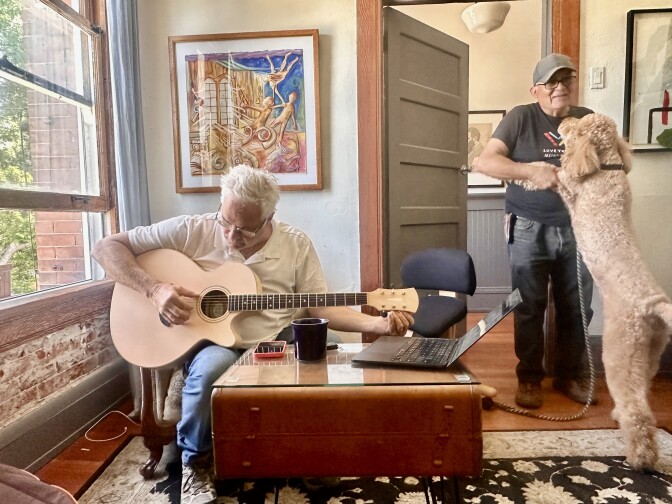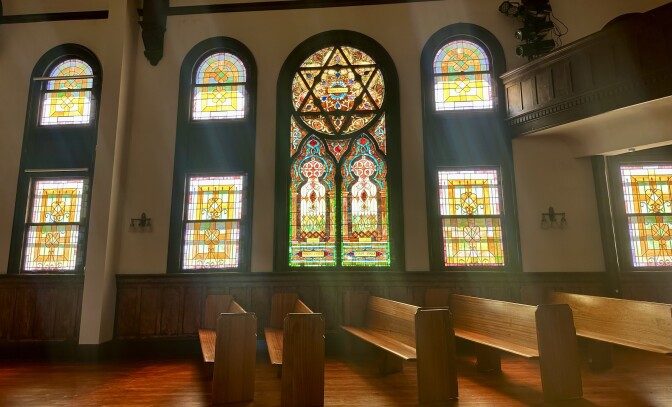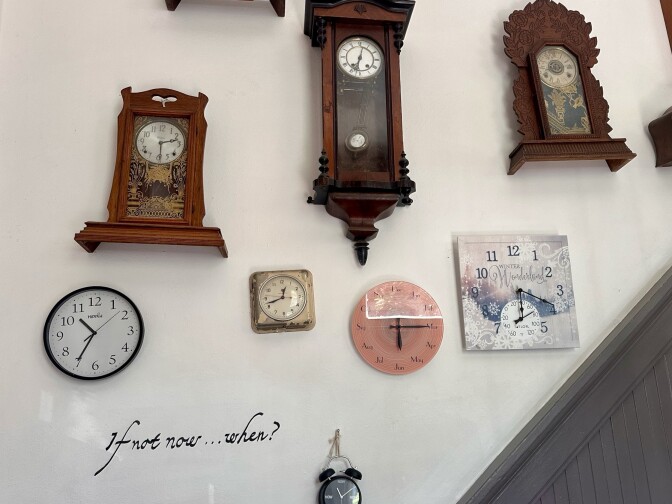This story is free to read because readers choose to support LAist. If you find value in independent local reporting, make a donation to power our newsroom today.
More People Are Pulling Away From Religion, But There Are Ways To Find Your 'Church'

These days, more and more of us identify as “religiously unaffiliated.”
We don’t regularly go to church, synagogue, mosque or any formal religious institution.
Many of us don’t say grace before each meal, recite prayers at dawn or light candles to usher in Friday night shabbat.
A recent survey by the Public Religion Research Institute found that more than one-quarter of Americans now identify as atheists, agnostics or religiously unaffiliated. It’s the highest level of non-religiosity in the poll’s history.
The cost of losing our religion
For some, the decision to disaffiliate is a reaction to polarizing politics or institutional scandals that have come to light in recent years. Others, in our tech-driven, fast-paced world, are simply too busy to prioritize their faith.
The reasons behind this decline are multilayered and, given certain restrictive ideologies that imbue many of these institutions, often appropriate. But more than just religion is lost as people walk away from it, says Diane Winston, professor of Media and Religion USC.
“As people dropped out of churches and synagogues over the last 20 years or so, they often didn't realize that religious institutions have a lot more going for them than worship services,” explains Winston, who studies the place of religion in American identity. “A lot of the fellowship and attention people got was not going to be given to them anywhere else.”
According to a 2021 Gallup poll, less that 50% of Americans say they belong to a church, synagogue or mosque — down from 70% in 1999.
Outside of traditional worship services, religious institutions also foster community, Winston says. Through services like social action opportunities, children’s camps, educational programs and music groups — along with the sheer existence of a regularly attended place for collective life — they create strong communities of families and social bonds. These, notes Winston, are the things that have been proven to lead to higher levels of happiness, fulfillment and even a longer life.
“They're really full-stop shopping for people who are looking for community,” Winston says. “People get mad at the institution maybe because they don't like some of the policies or the beliefs. But they're losing more than a quote-unquote 'religious experience.' They're losing a community experience and that's something that's hard to find in other places.”
Searching for 'more'
Beyond the loss of a community connection, the erosion of these institutions has led to the loss of something more intangible, too.
Call it a relationship with God, a higher power, spirituality, a connection with the divine (whatever that might mean to you). Or simply, an emphasis on sacredness — and the spaces made for connecting to that — within day to day life.
“I think whether or not people verbalize it, they are looking for that,” Winston says. “That recognition that there is more to life than our work and our money making.”
In a post-pandemic world, we know people are yearning to be with others and to feel a sense of belonging to something. Add in our hectic schedules and over-reliance on technology to do pretty much everything, including connect with others, Winston adds that people are longing for something more meaningful — something simply "more."
“I believe people are looking for new ways to connect, a new way of being present for other people,” Winston says.
She says she’s heard it called"‘empathy" or "human flourishing" or simply "kindness."
“There a lot of people who don’t want to use a word like ‘religion’ or ‘spirituality’ — they want a less charged word," she said.
The Pico Union Project

Just before lunchtime on a spring Tuesday, Jorge Alvarez, a caretaker at the Pico Union Project, leads a group of attendees, volunteers and employees through a pre-meal prayer.
He begins with what sounds like a traditional Christian meal blessing.
“Heavenly father, we come to your presence to let you know we appreciate you who you are. Thank you so much for this food.”
Then, he finishes the blessing in Hebrew.
“Barukh ata Adonai Eloheinu, melekh ha`olam, hamotzi Lechem…Amen!”
The Pico Union Project is in the heart of the Pico Union neighborhood near downtown in a brick 1909 building that was once the oldest synagogue in L.A. It is a multi-denominational community outreach and cultural center and serves as a house of worship for communities of all faiths and backgrounds.
It aims to provide a space for people to find that “something more” that Diane Winston of USC was talking about, leaving out many of the issues people have had with institutional religion.
“There are all kinds of ways people find to come together and provide themselves with the same fellowship, sense of sacredness and sense of being part of something larger that are currently outside traditional religious institutions and may not even be thought of as religion, per se," notes Winston.

Beyond worship services, Pico Union is a food distribution center for the largely low-income residents of the Pico Union neighborhood, serving fresh, healthy produce to those in need each Friday morning.
“When I first came here, the minute I walked into the building, I knew we’d buy it,” says Craig Taubman, founder of the Pico Union Project who bought the building in 2013.
“I had no idea how I was going to afford it,” he adds, laughing. “But there’s just so much here that’s sacred — not in a godly sense — just that it’s unique, it’s special, it’s holy.”

Finding your 'church'
Taubman says among all the services they offer, the goal is to help people connect — in their own way — to each other in the community, and to their version of the divine.
“People must gather together,” Taubman says. “And no matter what you believe in, who you are, where you’re from, or what you’ve done, you can show up here. We encourage it.”
Taubman is a rabbi, but also a musician whose songs, as he puts it, “bridge traditional Jewish themes and ancient teachings with passages and experiences from contemporary Jewish life.”

Music is at the heart of both the religious and non-religious services at the Pico Union Project, with top talents performing on the church stage each week and ongoing music classes for kids and adults.
“Church for me has always been wherever I’m experiencing that art that I love,” says musician and composer Ross Chait, who oversees talent booking for the Pico Union Project. “I think everyone should have that experience of being able to find that thing that brings them to life.”
Growing up in Laurel Canyon, Chait says he knows how privileged he was to be able to pursue music from a young age, and essentially find his "church." Part of his mission for the Pico Union Project is to bring communities of musicians together and help anyone who attends a concert, service, class or social action engagement to be able to find their own.
“People make church out of whatever they need,” he says. “I think this place is unique in its ability to offer different kinds of sacred experiences to a lot of different people.”








